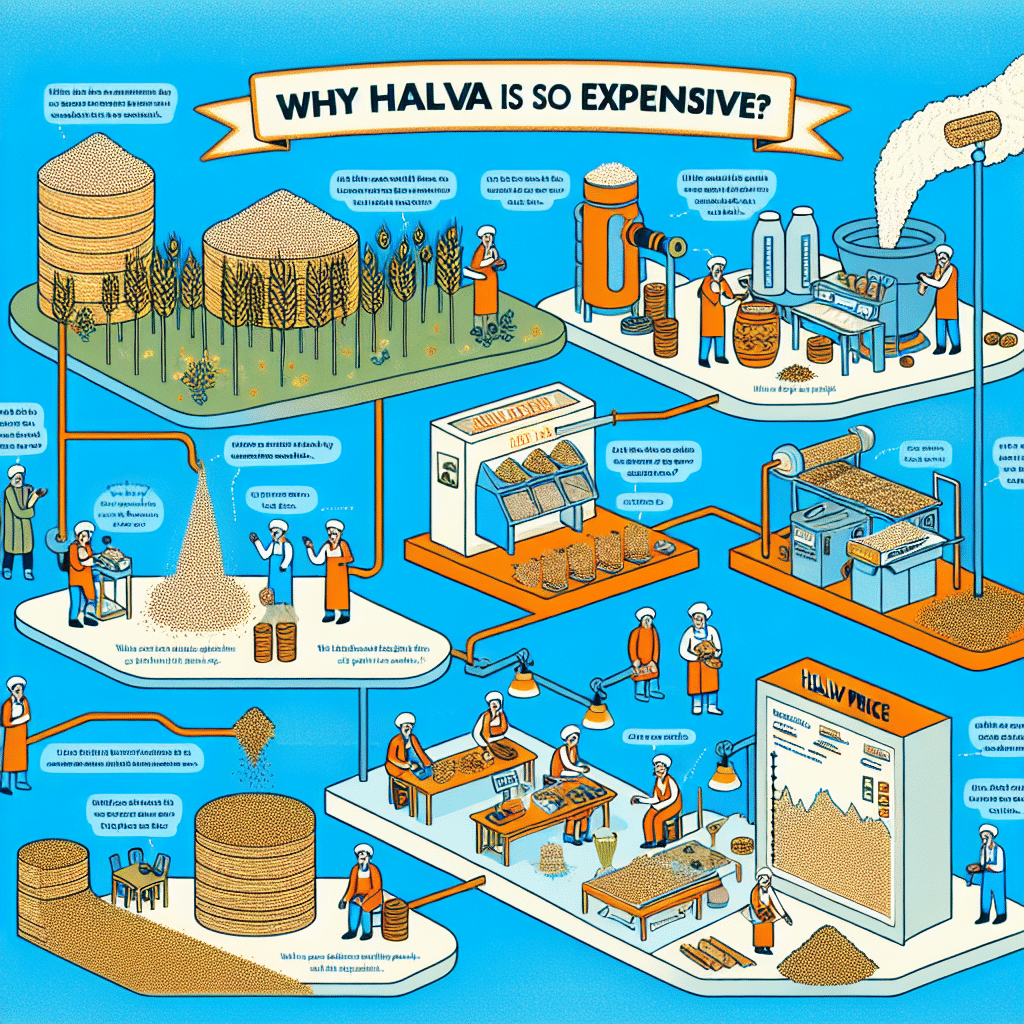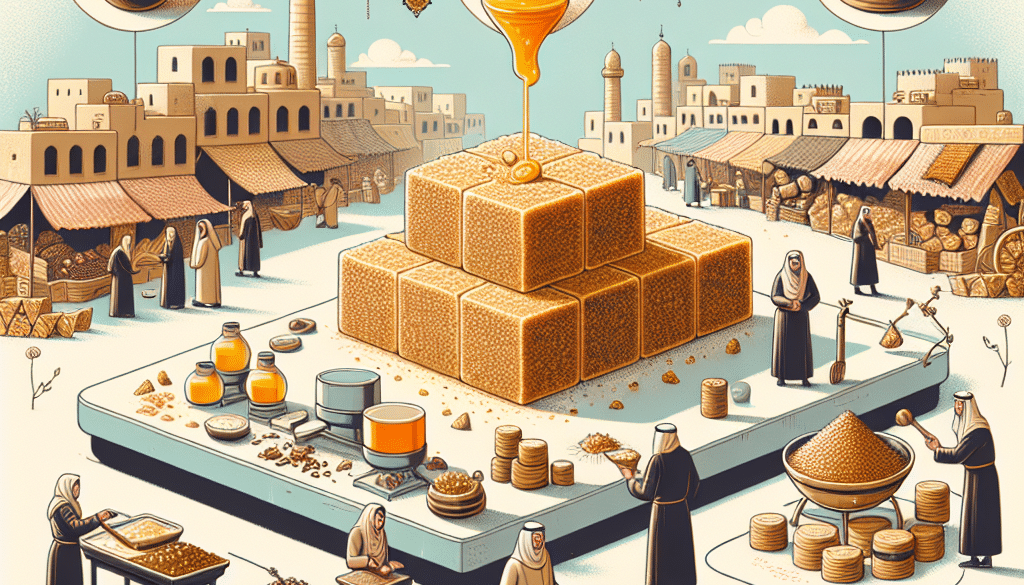Why Is Halva So Expensive?
-
Table of Contents
- Halva: Understanding the High Cost of This Traditional Delicacy
- The Artisanal Production Process
- Premium Ingredients at a Premium Price
- Import and Distribution Costs
- Cultural and Historical Significance
- Case Studies: Regional Variations and Their Impact on Price
- Market Demand and Consumer Willingness to Pay
- Conclusion: The True Value of Halva
- Enhance Your Diet with ETprotein’s Premium Protein Products
Halva: Understanding the High Cost of This Traditional Delicacy

Halva, a dense, sweet confection with roots in the Middle East, Eastern Europe, and the Indian subcontinent, has been savored for centuries. Despite its widespread popularity, many consumers find themselves asking why this seemingly simple treat often comes with a high price tag. This article delves into the factors that contribute to the cost of halva, offering insights into the traditional methods of production, quality of ingredients, and cultural significance that make it more than just a dessert.
The Artisanal Production Process
The making of halva is an art form that has been passed down through generations. Unlike mass-produced sweets, traditional halva is often made by skilled artisans who use time-honored techniques. This labor-intensive process includes the careful roasting of sesame seeds or other nuts, the preparation of a sugar syrup, and the meticulous mixing of these components to achieve the perfect consistency. The expertise required for this craft, along with the time and labor involved, contribute significantly to the cost.
Premium Ingredients at a Premium Price
Quality is paramount when it comes to the ingredients used in halva. The main component, sesame seeds, must be of the highest quality to ensure a rich flavor and texture. These seeds are often sourced from select regions known for their superior crops, which can drive up the price. Additionally, high-quality halva may contain expensive ingredients like pistachios, almonds, or real vanilla, which further increase the cost.
Import and Distribution Costs
For many consumers outside the regions where halva is traditionally made, the cost of importing this delicacy can be substantial. Import taxes, shipping fees, and the logistics of keeping the product fresh during transport all add to the final retail price. Furthermore, as halva is considered a specialty item in many countries, it is often sold through niche markets or gourmet food stores, which typically charge a premium.
Cultural and Historical Significance
Halva is not just a sweet treat; it is steeped in cultural and historical significance. In many cultures, it is an integral part of celebrations and religious ceremonies, which can elevate its status and, consequently, its price. The reverence for halva and its place in social and religious rituals can make it more valuable than other confections.
Case Studies: Regional Variations and Their Impact on Price
Different regions have their own unique versions of halva, each with varying ingredients and methods of preparation. For example, the pistachio halva of the Middle East is renowned for its luxurious taste and is often more expensive due to the high cost of pistachios. In contrast, Indian halva varieties may include a wide range of ingredients like carrots, lentils, or ghee, which can affect the price based on scarcity and demand.
Market Demand and Consumer Willingness to Pay
The demand for authentic, high-quality ethnic foods has been on the rise, and halva is no exception. Consumers who value traditional foods and are willing to pay for authenticity help sustain the higher prices of artisanal halva. This willingness to pay for a genuine experience supports the artisans who continue to make halva using traditional methods.
Conclusion: The True Value of Halva
In conclusion, the cost of halva is influenced by a combination of factors, including the artisanal production process, the quality of ingredients, import and distribution costs, and its cultural and historical significance. While it may be more expensive than other sweets, the price reflects the traditional craftsmanship, premium components, and the rich cultural heritage that halva represents. For those who appreciate the artistry and history behind this delicacy, the cost is a small price to pay for an authentic taste experience.
Enhance Your Diet with ETprotein’s Premium Protein Products
If you’re looking to complement your diet with high-quality protein sources, consider exploring ETprotein’s range of organic bulk vegan proteins and L-(+)-Ergothioneine (EGT). Their products are designed to cater to various industries and personal health needs, ensuring that you receive the best in terms of taste, purity, and nutritional value. Whether you’re involved in sports nutrition, weight management, or simply seeking to improve your overall health, ETprotein has a protein solution for you.
About ETprotein:
ETprotein, a reputable protein and L-(+)-Ergothioneine (EGT) Chinese factory manufacturer and supplier, is renowned for producing, stocking, exporting, and delivering the highest quality organic bulk vegan proteins and L-(+)-Ergothioneine. They include Organic rice protein, clear rice protein, pea protein, clear pea protein, watermelon seed protein, pumpkin seed protein, sunflower seed protein, mung bean protein, peanut protein, and L-(+)-Ergothioneine EGT Pharmaceutical grade, L-(+)-Ergothioneine EGT food grade, L-(+)-Ergothioneine EGT cosmetic grade, L-(+)-Ergothioneine EGT reference grade and L-(+)-Ergothioneine EGT standard. Their offerings, characterized by a neutral taste, non-GMO, allergen-free attributes, with L-(+)-Ergothioneine purity over 98%, 99%, cater to a diverse range of industries. They serve nutraceutical, pharmaceutical, cosmeceutical, veterinary, as well as food and beverage finished product distributors, traders, and manufacturers across Europe, USA, Canada, Australia, Thailand, Japan, Korea, Brazil, and Chile, among others.
ETprotein specialization includes exporting and delivering tailor-made protein powder and finished nutritional supplements. Their extensive product range covers sectors like Food and Beverage, Sports Nutrition, Weight Management, Dietary Supplements, Health and Wellness Products, and Infant Formula, ensuring comprehensive solutions to meet all your protein needs.
As a trusted company by leading global food and beverage brands and Fortune 500 companies, ETprotein reinforces China’s reputation in the global arena. For more information or to sample their products, please contact them and email sales(at)ETprotein.com today.














